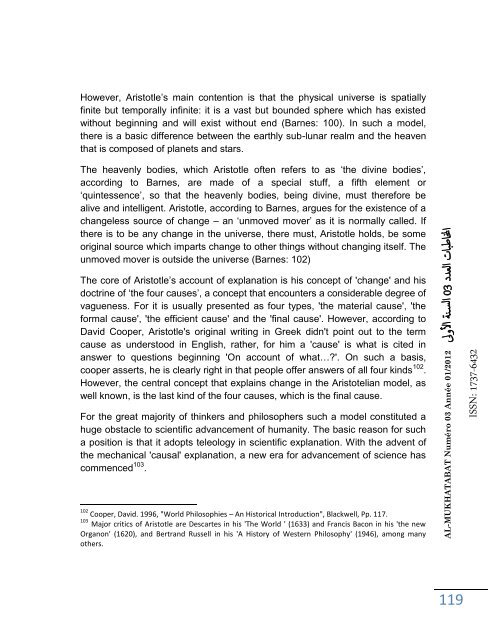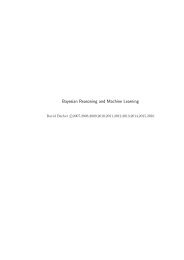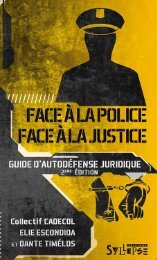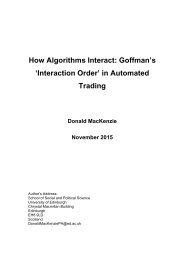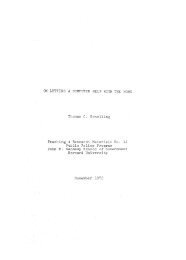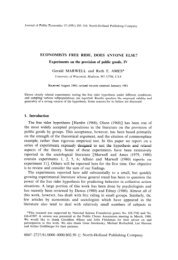n3-al-mukhatabat-journal
n3-al-mukhatabat-journal
n3-al-mukhatabat-journal
Create successful ePaper yourself
Turn your PDF publications into a flip-book with our unique Google optimized e-Paper software.
However, Aristotle’s main contention is that the physic<strong>al</strong> universe is spati<strong>al</strong>ly<br />
finite but tempor<strong>al</strong>ly infinite: it is a vast but bounded sphere which has existed<br />
without beginning and will exist without end (Barnes: 100). In such a model,<br />
there is a basic difference between the earthly sub-lunar re<strong>al</strong>m and the heaven<br />
that is composed of planets and stars.<br />
The heavenly bodies, which Aristotle often refers to as ‘the divine bodies’,<br />
according to Barnes, are made of a speci<strong>al</strong> stuff, a fifth element or<br />
‘quintessence’, so that the heavenly bodies, being divine, must therefore be<br />
<strong>al</strong>ive and intelligent. Aristotle, according to Barnes, argues for the existence of a<br />
changeless source of change – an ‘unmoved mover’ as it is norm<strong>al</strong>ly c<strong>al</strong>led. If<br />
there is to be any change in the universe, there must, Aristotle holds, be some<br />
origin<strong>al</strong> source which imparts change to other things without changing itself. The<br />
unmoved mover is outside the universe (Barnes: 102)<br />
The core of Aristotle’s account of explanation is his concept of 'change' and his<br />
doctrine of ‘the four causes’, a concept that encounters a considerable degree of<br />
vagueness. For it is usu<strong>al</strong>ly presented as four types, 'the materi<strong>al</strong> cause', 'the<br />
form<strong>al</strong> cause', 'the efficient cause' and the 'fin<strong>al</strong> cause'. However, according to<br />
David Cooper, Aristotle's origin<strong>al</strong> writing in Greek didn't point out to the term<br />
cause as understood in English, rather, for him a 'cause' is what is cited in<br />
answer to questions beginning 'On account of what…?'. On such a basis,<br />
cooper asserts, he is clearly right in that people offer answers of <strong>al</strong>l four kinds 102 .<br />
However, the centr<strong>al</strong> concept that explains change in the Aristotelian model, as<br />
well known, is the last kind of the four causes, which is the fin<strong>al</strong> cause.<br />
For the great majority of thinkers and philosophers such a model constituted a<br />
huge obstacle to scientific advancement of humanity. The basic reason for such<br />
a position is that it adopts teleology in scientific explanation. With the advent of<br />
the mechanic<strong>al</strong> 'caus<strong>al</strong>' explanation, a new era for advancement of science has<br />
commenced 103 .<br />
102 Cooper, David. 1996, "World Philosophies – An Historic<strong>al</strong> Introduction", Blackwell, Pp. 117.<br />
103 Major critics of Aristotle are Descartes in his 'The World ' (1633) and Francis Bacon in his 'the new<br />
Organon' (1620), and Bertrand Russell in his 'A History of Western Philosophy' (1946), among many<br />
others.<br />
AL-MUKHATABAT Numéro 03 Année 01/2012 لىولأا ةن سلا 30 ددعلا تابطانا<br />
119<br />
ISSN: 1737-6432


